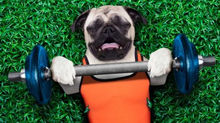To supplement or not to supplement?
- Noah Ray Sundell
- Jun 3, 2018
- 4 min read

I get many, many questions on supplements and I would like to take some time to help shed some light on the situation. The BIGGEST piece of advice I can give you, is that you cannot out-supplement bad nutrition. If you are not fueling correctly before / after workouts and throughout your entire day, do not even look in the direction of a GNC. Your body hugely prefers to get anything through actual food rather than a supplement. Why? Food sources are more bioavailable, or able to be used quicker and more efficiently. [Work with a nutritionist, folks!!!] Your nutrition is made up of micro- and macro-nutrients. Micro-nutrients are the vitamins and minerals that are densely packed into healthy stuff like nuts and greens. Your macro-nutrients are the fat, carbs, and protein that you see on food labels. It is important to know what you're at high risk for a deficit of, and always eating a varied diet is your best defense against falling short on something important. For example, vegans are likely to not get enough B12 in their diets, because most of our sources of it come from animal products.
WHAT SHOULD I KNOW? For vitamins, there are A, C, D, E, K and B. Vitamins B and C are water soluble, which means that if we get more than the body can use, they are simply passed in urine. Yes, that means if you do not have a deficiency in biotin and you're taking extra to try and make your nails more firm, you might be throwing money away. Ahem, you ARE throwing money away. For the remaining four, they are fat soluble, which means that the excess is stored in our bodies. This gets a bit more tricky, because it is possible to consume toxic amounts of these. For example, consuming too much vitamin A can cause many side effects including nausea and joint pain. In both cases, consuming too much of any one vitamin is a bad idea. You can always check these levels through lab tests, but the golden rule applies here with "moderation". Other than vitamins, there are many common bodybuilding supps, such as creatine and protein. I'll cover these individually below. COMMONLY USED
- Creatine. Creatine is a favorite of bodybuilders because of the low cost and supposed benefits. A lot of research has been done and it is the general consensus that it improves strength, muscle size, and recovery time. The other effect is cell volumization, which fills the cells with more water, making them appear larger. Some users report general bloating, however. There are many types of creatine with varying costs, so if you're interested, hop on some research. It is relevant to note that many types of fish do contain creatine, so if you're leaning towards less supplementation, that's an option. - BCAA's
BCAA stands for Branch Chain Amino Acid. It's basically the building blocks of protein. We have 20 amino acids in our bodies, and of those 20, we need to get 9 of them from our diet, as the body does not make them under any circumstances. This is where a varied diet comes in. If you get all of your protein from meat, it's likely that you're lacking something. Try getting some protein from beans and nuts as well. BCAA's are a less common one than creatine, but still fairly prevalent. For these, I would recommend to someone that has trouble getting enough protein throughout the day, or someone on a plant-based diet.
- Pre-Workout
This is a funny one. Pre-workout is more or less, a mental boost. It doesn't do anything for you physically (to combat metabolic or mechanical fatigue) but it will make you more energized, which will likely make you give your absolute best effort while working out. Some pre-workouts stack things like BCAA's or creatine into them, and you can make an educated call there. Personally, I recommend that someone drink a coffee before the gym but if it works for you, there isn't likely to be many side effects. Be wary if you have high blood pressure, however.
- Whey / Casein Protein For protein, as I stated above, I hugely prefer that you address your diet before running to get a tub of whey. If you've seen the huge guy in the gym with a shake, it may be because he weighs 250lbs and getting enough protein for his daily maintenance is a tall order. I personally supplement with pea protein because I don't eat meat. If you have addressed your diet and still would like to use shakes, make sure you're getting the right one. Whey protein is usually what folks will have pre- and post-workout. Think of it as the fast-acting one. Casein is slowly released into your body, and more often consumed right before bed because it will essentially be feeding your muscles while you rest, instead of your body feeding on your muscles. Keep in mind that if you are consuming too much protein, it will eventually stop being fed to your muscles, and will actually just contribute to extra calories stored as fat.
THE BOTTOM LINE. Make sure that before you rush to buy what your idol pours into their body, make sure it is relevant to your goals, and that the pros outweigh the cons for you personally. Every single body is different and will respond in different ways to what you're doing. That includes progress with exercising. Be patient and kind to yourself on the journey; your body will thank you. Oh, and EAT UP.
*This article is meant to provide insight and additional information, and each individual should always consult a physician before making adjustments to their nutrition plans to ensure safety.*


















Comments